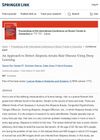3 citations,
December 2019 in “Biomaterials Research/Biomaterials research” Calcium and magnesium in hair increase with age and are higher in adult women.
 1 citations,
October 2023 in “The Journal of nutrition, health & aging”
1 citations,
October 2023 in “The Journal of nutrition, health & aging” Higher hair levels of zinc and chromium were linked to less cognitive decline in very old people.
 February 2023 in “Journal of clinical medicine research”
February 2023 in “Journal of clinical medicine research” Zinc acetate hydrate may help reduce fatigue and hair loss in post-COVID-19 patients.
 March 2021 in “Egyptian Journal of Chemistry”
March 2021 in “Egyptian Journal of Chemistry” The herbal shampoo with Momordica charantia and Hibiscus Rosa-Sinensis is safe and promotes hair growth and scalp health.
October 2022 in “The Korean Journal of Physiology and Pharmacology” Targeting the PGD2-DP2 pathway may help treat hair loss.
63 citations,
February 2017 in “ACS biomaterials science & engineering” Polydopamine is a safe, effective, and permanent hair dye that turns gray hair black in one hour.
 59 citations,
February 1998 in “Chemico-Biological Interactions”
59 citations,
February 1998 in “Chemico-Biological Interactions” Minoxidil breakdown varies by enzymes, affecting hair loss treatment effectiveness.
 34 citations,
October 2017 in “Archivos Argentinos De Pediatria”
34 citations,
October 2017 in “Archivos Argentinos De Pediatria” Alopecia Areata is a complex, unpredictable autoimmune hair loss condition with limited treatment options and a significant psychological impact.
32 citations,
February 2018 in “Spectrochimica acta. Part A, Molecular and biomolecular spectroscopy” Cosmetic residues on individual hairs can be identified and differentiated using ATR FT-IR microspectroscopy.
 22 citations,
April 2003 in “Eye”
22 citations,
April 2003 in “Eye” Applying latanoprost on skin can stimulate hair growth with minimal side effects.
 17 citations,
February 2015 in “Phytochemistry Reviews”
17 citations,
February 2015 in “Phytochemistry Reviews” Southeast Asian herbs show promise for skin and hair care, but more research is needed to confirm their effectiveness in cosmetics.
 16 citations,
April 2012 in “Journal of mammalogy”
16 citations,
April 2012 in “Journal of mammalogy” Young female Australian fur seals are losing hair due to low tyrosine and zinc levels and high pollution exposure.
 13 citations,
May 1993 in “International Journal of Dermatology”
13 citations,
May 1993 in “International Journal of Dermatology” The paper suggests that telogen effluvium, a type of hair loss, may be a long-lasting condition triggered by stress or illness in people whose hair growth is unusually synchronized.
 10 citations,
July 2019 in “Journal of Asia-Pacific Entomology”
10 citations,
July 2019 in “Journal of Asia-Pacific Entomology” Different silkworm varieties have varying nutrient levels in their powders, which may promote hair growth.
 8 citations,
January 2007 in “International journal of experimental pathology”
8 citations,
January 2007 in “International journal of experimental pathology” Hairless HRS/J mice resist Bacillus anthracis skin infections due to high numbers of immune cells, not because they lack hair follicles.
4 citations,
January 2019 in “Archives of clinical and medical case reports” Combining FUE hair transplantation with PRP improves hair density and patient satisfaction in scarring alopecia.
 2 citations,
October 2000
2 citations,
October 2000 The investigation found no work-related causes for employee hair loss at Equifax Payment Services, and the environment was not hazardous.
 December 2022 in “Scientific Reports”
December 2022 in “Scientific Reports” Stem cells from whiskers can be transplanted to stimulate hair growth.
Taking supplements after sleeve gastrectomy surgery can reduce hair loss by addressing nutritional deficiencies.
 October 1997 in “Baylor University Medical Center Proceedings”
October 1997 in “Baylor University Medical Center Proceedings” Obesity in the U.S. is largely influenced by diet and exercise, certain medications can improve heart procedures and hair growth, and major teaching hospitals have better patient outcomes.
 34 citations,
February 1993 in “Journal of steroid biochemistry and molecular biology/The Journal of steroid biochemistry and molecular biology”
34 citations,
February 1993 in “Journal of steroid biochemistry and molecular biology/The Journal of steroid biochemistry and molecular biology” Certain 4-azasteroids are effective at blocking the enzyme that processes testosterone in human skin and could help treat acne, excessive hair growth, and male pattern baldness.
 3 citations,
September 2019 in “Journal of Orthodontics”
3 citations,
September 2019 in “Journal of Orthodontics” A boy's hair grew back after he stopped using orthodontic headgear that caused temporary hair loss.
 August 2023 in “Scientia Pharmaceutica”
August 2023 in “Scientia Pharmaceutica” Color changes in Minoxidil hair products do not affect their effectiveness.
 25 citations,
January 2017 in “International Journal of Trichology”
25 citations,
January 2017 in “International Journal of Trichology” Most Indian people with hair loss in the study lacked nutrients, especially iron.
November 2023 in “Cosmetics” Rice derivatives in conditioners protect and improve hair health.
 January 2021 in “Lecture notes in networks and systems”
January 2021 in “Lecture notes in networks and systems” Deep learning can accurately detect Alopecia Areata with up to 98.3% accuracy.
 5 citations,
December 2021 in “Physiological Research”
5 citations,
December 2021 in “Physiological Research” Men, particularly those with hair loss, are more likely to get the virus, and those with prostate cancer may have milder symptoms. Testosterone's role in the disease is unclear, and the virus doesn't seem to harm male fertility. Women with PCOS might be at higher risk. More research is needed.
 70 citations,
July 2020 in “Pharmacological Reports”
70 citations,
July 2020 in “Pharmacological Reports” Cepharanthine, a Japanese hair loss drug, shows promise as a COVID-19 treatment but needs more testing.
 7 citations,
January 2018 in “Medicinski arhiv”
7 citations,
January 2018 in “Medicinski arhiv” A herbal extract may help treat certain types of hair loss by reducing a specific gene's activity.
1 citations,
January 2023 in “Chemical Engineering Journal”





















